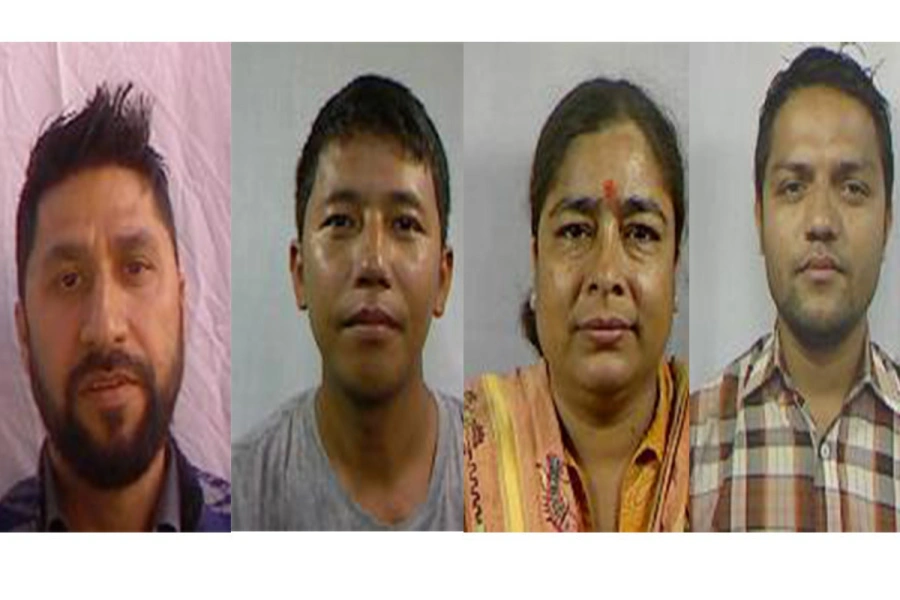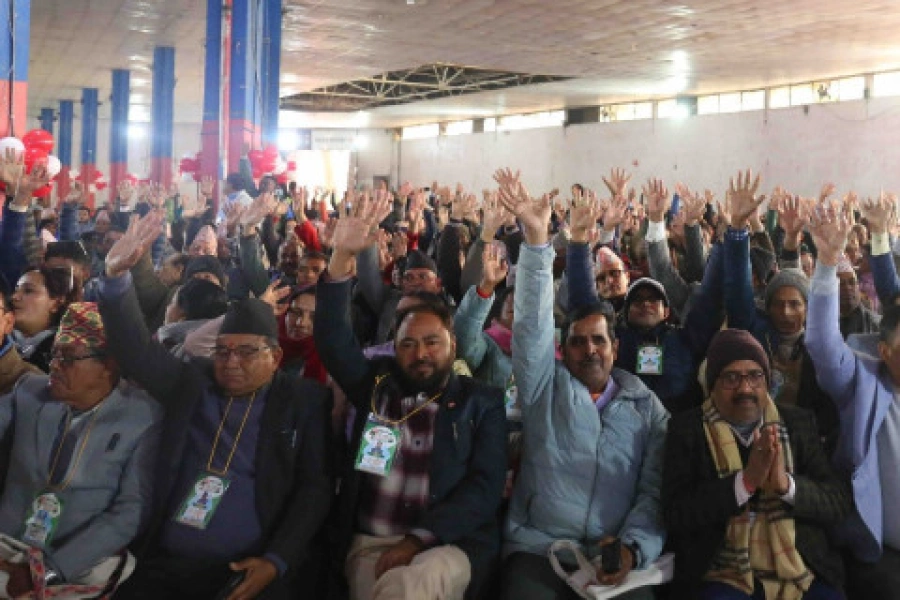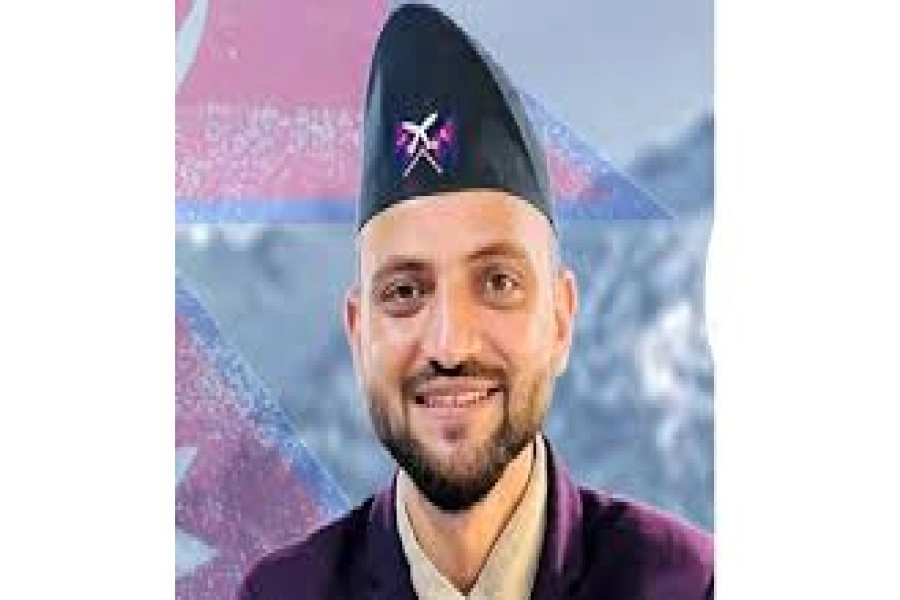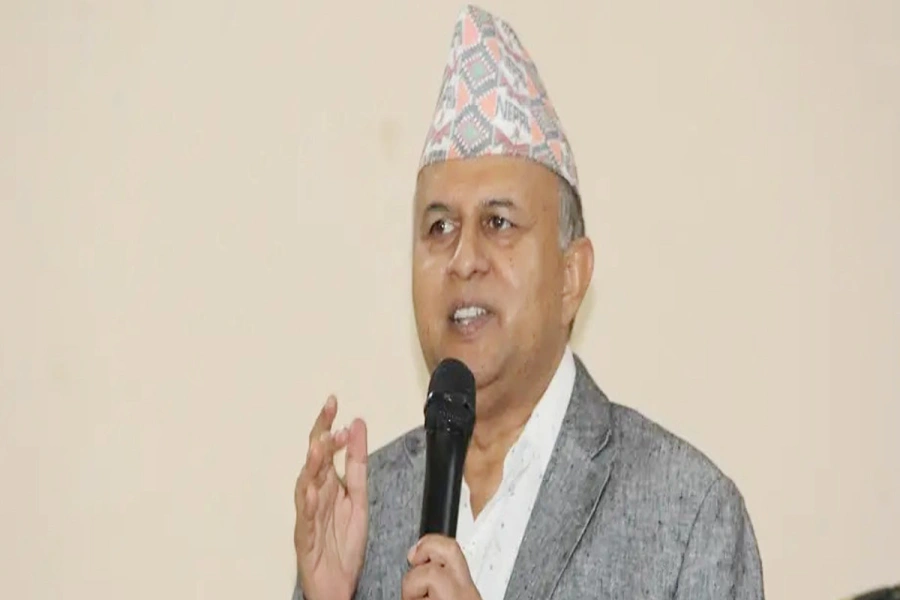KATHMANDU, August 25: Prime Minister Sher Bahadur Deuba has assured India that the ruling parties would make another attempt to bring an amendment to the new constitution of Nepal to accommodate the concerns of all groups in the country.
Addressing a joint press conference held after the bilateral meeting between Nepal and India at Hyderabad House, New Delhi on Thursday, Prime Minister Deuba gave the assurance as the attempt to amend the constitution earlier this week did not succeed.
Prime Minister Deuba said that the ruling parties are in favor of amending the constitution to address the concerns of all sections of the people and pave the way for the agitating parties including Rastriya Janata Party Nepal to take part in the polls. “We tried to amend constitution to make it acceptable to all sides. But we could not secure two-third majority vote in parliament,” he said.
Deuba said that they plan to introduce an amendment bill again once they have a two-third majority in parliament. “I hope in future we will have two-third majority and we will amend the constitution so that people living in the southern part and those living in the east and west accept it as their constitution,” Deuba said.
Deuba’s remarks come in the wake of parliament failing to endorse the constitution amendment bill, which was put to a vote Monday. The ruling parties had secured only 347 out of the requisite 395 votes in favor of the bill.
Although all other major countries had welcomed the promulgation of the new constitution through the elected Constituent Assembly (CA) in September 2015, India has so far only ‘noted’ it, refraining from welcoming it. Speaking before Deuba, Indian Prime Minister Narendra Modi made it clear that India continues to maintain its previous stance on the constitution amendment issue.
While lauding Deuba for his role in strengthening the democratic system in Nepal, Modi congratulated the Nepal government for successfully holding two phases of local elections under the framework of the new constitution. “I have a full confidence that under your adroit and experienced leadership dialogue will continue with all sections of society and Nepal will be able to successfully implement the constitution by incorporating the aspirations of all its citizens in it,” said Modi, exerting subtle pressure on Nepal to amend the constitution.
Members of Deuba’s delegation said the Indian side has, however, softened its tone on the amendment, not trying to show any heavy-handedness and not urging any rush this time. In a big departure from pre-embargo days, India seems happy as long as “sincere” efforts are seen to be made to take everyone along.
Modi, while speaking on the occasion, also informed that he had positive discussions with Prime Minister Deuba to further expand cooperation between the two countries in various areas including trade, transit, connectivity and people-to-people contacts. Stating that work is currently underway on the construction of railways, a postal highway and integrated check posts, Modi said the two sides have agreed to finalize the Detailed Project Report of the Pancheshwar Multi-purpose Project at the earliest.
Modi said the two countries have reached agreement in principle to build a Polytechnic Institute and a Girija Prasad Koirala National Center for Respiratory Disease in Dhangadhi.
Besides developing separate Buddha and Ramayan pilgrim circuits connecting the related holy sites in both countries, Modi also said that they have agreed to enhance people-to-people contacts through skill development and capacity building for people.
Prime Minister Deuba has invited Modi to inaugurate the Arun III project, while informing that the land acquisition process has already been completed.
Here is a specimen of India-Nepal Joint Statement during the State Visit of Prime Minister of Nepal to India (23-27 August 2017)
1. The Rt. Hon’ble Mr. Sher Bahadur Deuba, Prime Minister of Nepal, and Dr. Arzu Rana Deuba, are on a State visit to India from August 23-27, 2017, at the invitation of Prime Minister of India, Shri Narendra Modi. The delegation includes Deputy Prime Minister and Minister for Foreign Affairs of Nepal Mr. Krishna Bahadur Mahara, Minister for Finance of Nepal Mr. Gyanendra Bahadur Karki, Minister for Culture, Tourism and Civil Aviation of Nepal Mr. Jitendra Narayan Dev, Minister for Commerce of Nepal Mr. Meen Bahadur Bishwakarma, Members of Legislature-Parliament of Nepal and other senior officials of the Government of Nepal.
2. The Prime Minister of Nepal was accorded a ceremonial reception at the forecourt of Rashtrapati Bhavan on August 24, 2017. He paid respects and tribute to the memory of Mahatma Gandhi at Rajghat. The Prime Minister of Nepal called on Hon’ble President of India, Shri Ram Nath Kovind, and Hon’ble Vice President of India, Shri M. Venkaiah Naidu. External Affairs Minister of India Smt. Sushma Swaraj, Minister of Finance Shri. Arun Jaitley called on the Prime Minister of Nepal.
3. Prime Minister of Nepal interacted with Indian business community at a function jointly hosted by ASSOCHAM, CII, and FICCI, and will deliver an address at a think-tank in New Delhi. Apart from his official engagements in New Delhi, Prime Minister of Nepal will also visit Hyderabad, Tirupati and Bodhgaya.
4. The two Prime Ministers held comprehensive talks on all aspects of bilateral relationship. The talks were held in an atmosphere of utmost cordiality and warmth that have characterized the close and friendly relations between India and Nepal. An official banquet was hosted by Prime Minister of India in honour of the visiting dignitary and his delegation.
Broadening partnership through high-level exchanges
5. The Prime Minister of India thanked Prime Minister of Nepal for accepting his invitation and warmly welcomed him to India on his first visit abroad since assuming office in June 2017. This is Prime Minister Deuba’s landmark fourth visit to India as the Prime Minister of Nepal and holds special significance as it is taking place in the 70th year of establishment of India-Nepal diplomatic relations. The Prime Minister of Nepal congratulated the Government and people of India on marking the completion of 70th year of India's Independence. He thanked Prime Minister of India for the warm invitation and hospitality extended to him and his delegation. He stated that his visit to India demonstrates the importance that the Government of Nepal attaches to good neighbourly relations with India.
6. The Prime Minister of India, on behalf of people and Government of India, conveyed deepest condolences and sympathies to people and Government of Nepal on loss of precious lives and damage to property and infrastructure as a result of floods in Nepal. He conveyed that India stands ready to provide all possible relief assistance to Nepal. The Prime Minister of Nepal thanked Government of India for its support to relief efforts of Nepal. He also expressed deepest condolences and sympathies on the loss of lives and damage to property and infrastructure on the Indian side.
7.The two Prime Ministers appreciated the regular exchange of high-level visits that have given a new momentum in taking the bilateral cooperation agenda forward. They appreciated the regular meetings of sector specific bilateral mechanisms across diverse sectors of cooperation. The two Prime Ministers welcomed the visits of Members of Legislature-Parliament of Nepal to India and expressed hope to see increased frequency of such engagements between the two parliaments.
8. The two Prime Ministers expressed satisfaction over the excellent state of India-Nepal relations that are deep, comprehensive and multi-faceted. They pledged to pursue new opportunities to further deepen bilateral relations for the benefit of the peoples of both countries, while committing to further reinvigorate the existing mechanisms. The two Prime Ministers reaffirmed their commitment to work towards strengthening bilateral relations on the basis of mutual trust, goodwill, mutual benefit, with due regard to each other’s aspirations, sensitivities and interests.
9. The two Prime Ministers underlined the indispensability of democratic institutions for peace, development and prosperity. The Prime Minister of Nepal shared with the Prime Minister of India the recent political developments in Nepal. The Prime Minister of India welcomed the successful conduct of two phases of local level elections and congratulated the Prime Minister of Nepal for this achievement. He appreciated the efforts being made by the Government of Nepal to take all sections of society on board in constitution implementation process and in establishing Nepal as a federal, democratic republic. The Prime Minister of Nepal thanked the Prime Minister of India for the assistance provided for the conduct of local level elections in Nepal.
India drops Shubman Gill from T20 World Cup squad

10. The two Prime Ministers expressed satisfaction on the progress made by the Eminent Persons Group on Nepal-India Relations in their four meetings since its establishment in February 2015. They hoped that the Group would submit its report within its mandated period, suggesting measures to further expand the close and multifaceted ties between the two countries, in accordance with its Terms of Reference, including any recommendations on review of past bilateral treaties.
Strengthening defence and security cooperation
11. The two Prime Ministers expressed satisfaction over the ongoing defence cooperation and committed to further enhancing close cooperation between the Indian Army and the Nepal Army. Prime Minister of Nepal thanked the Government of India for continued assistance in training and capacity building of the security forces of Nepal.
12. The two Prime Ministers expressed satisfaction at the excellent cooperation on security-related matters. The two sides expressed commitment to ensure that the open border, a unique feature of India-Nepal bilateral relations that has facilitated unhindered movement of people on both sides of the border, is not misused by unscrupulous elements posing security threat to either side. The two sides reiterated their commitment that their respective territories would not be allowed to be used for any activities inimical to the other.
Partnership for sustainable development
13. The two Prime Ministers expressed satisfaction on the functioning of the ‘Oversight Mechanism’ established in 2016, and the progress made through the mechanism in resolving bottlenecks and speeding up implementation of ongoing projects under bilateral economic and development cooperation.
14. The Prime Minister of India reiterated India’s commitment to work with the Government of Nepal to expedite post-earthquake reconstruction projects in a time-bound manner. The two Prime Ministers expressed satisfaction at the finalization of modalities for implementation as well as identification of projects in the four identified sectors for India’s reconstruction assistance. It was agreed to identify at the earliest projects under the US$ 750 million Line of Credit for post-earthquake reconstruction.
15. The two Prime Ministers noted with satisfaction utilization of the two Lines of Credit of US$ 100 million and US$ 250 million for development of roads and power infrastructure in Nepal. The two Prime Ministers welcomed the allocation of US$ 200 million for irrigation projects, and US$ 330 million for development of roads from LoC of US$ 550 million.
16. The two Prime Ministers urged a constructive pursuit of a forward-looking development agenda wherein each country could learn from and contribute to the social and economic initiatives of a transformative nature. Towards this objective, it was agreed to initiate an annual policy dialogue between the NITI Aayog of India and the National Planning Commission of Nepal.
Enhancing cross-border connectivity through infrastructure development
17. The two Prime Ministers shared the view that enhanced connectivity between India and Nepal will increase people-to-people contacts as well as promote economic growth. The two Prime Ministers reviewed the progress made in the implementation of bilateral connectivity projects. Both sides recognized the need for early completion of two ongoing cross-border rail-link projects: (a) Jayanagar-Bijalpur-Bardibas and (b) Jogbani-Biratnagar rail-links. The two Prime Ministers noted with satisfaction that the railway line from Jayanagar to Janakpur and from Jogbani to Biratnagar Custom Yard will be completed by 2018. The Nepali side committed to resolve all issues for expeditious completion of both the projects.
18. The two Prime Ministers underlined the importance of rail links in India-Nepal connectivity as these links will usher in growth and development by way of enhanced trade and tourism links.The two Prime Ministers also agreed on early completion of the Field Location Survey of remaining three cross-border rail links (a) New Jalpaiguri to Kakarbhitta, (b) Nautanwa to Bhairahawa, and (c) Nepalgunj Road to Nepalgunj.
19. The two Prime Ministers welcomed the award of work of Integrated Check Post (ICP) at Biratnagar and directed their respective officials to pursue its construction and operationalize ICP Birgunj by December 2017. The two Prime Ministers underlined the need for early approval of Detailed Engineering Designs of ICPs at Bhairahawa and Nepalgunj.
20. The two Prime Ministers expressed satisfaction on the award of contract for twelve packages under nine roads, totalling about 240 kms, under the Terai Roads project. The Nepali side assured to resolve expeditiously all encumbrances relating to land acquisition, forest clearances and removal of utility services for early completion of the project.
21. The two Prime Ministers noted with satisfaction the progress in the construction of dharamshala at the Pashupatinath temple complex. They expressed hope that the work on the dharamshala and Nepal-Bharat Maitri Polytechnic at Hetauda would be expedited.
22. The Prime Minister of Nepal conveyed that the Government of Nepal considers the Motihari-Amlekhgunj petroleum pipeline project a priority project. The two Prime Ministers welcomed the finalization of Detailed Engineering Route Survey and Engineering Design reports of the project. They directed the concerned officials to expeditiously remove all bottlenecks, including Right of Way, land acquisition, environmental and regulatory clearances, so that the construction work could begin at the earliest.
23. The Prime Ministers welcomed the decision to set up a Joint Working Group on cooperation in oil and gas sectors, which would consider advancing cooperation in areas such as (a) construction of LPG pipeline from Motihari to Amlekhgunj; (b) construction of Natural Gas pipeline from Gorakhpur to Sunwal; c) assistance of IOCL for preparing DPR for extension of Petroleum Products pipeline from Amlekhgunj to Chitwan in Nepal.
Cooperation in projects of national priority for Nepal
24. In response to the Prime Minister of Nepal highlighting priority projects for Nepal’s growth and development, the Prime Minister of India underlined that India stands ready to provide economic and development cooperation assistance. The two sides reached in principle agreement for Indian grant assistance to support the establishment of Technical Institute in Far West of Nepal, and the GP Koirala National Centre for Respiratory Diseases in Tanahun. In addition, the two Prime Ministers agreed that their Governments would hold discussions to explore the feasibility of cooperation on mutually agreed basis on the following projects:
.Kushinagar-Lumbini-Kapilavastu and Bardibas-Birgunj Railways
.Up gradation of Birgunj-Pathlaiya-Narayanghat and Butwal-Pokhara
roads into express ways
.International Airport at Nijgadh
.Motorable Bridges on Mahakali River
.Maitri Bridge at Birgunj-Raxaul border
.Development of dry port at Dodhara Chandani
.Developing a Special Economic Zone in Nepal
. Development of new 132 kV transmission lines
.Butwal (Nepal)-Gorakhpur (India) cross-border transmission line
.Lumki (Nepal)-Bareilly (India) cross-border transmission line
Harnessing water resources and expanding energy cooperation
25. The two Prime Ministers, noting the positive and productive discussion on the Pancheshwar Multipurpose Project, directed the concerned officials to finalize its Detailed Project Report within a month.
26. The Prime Minister of Nepal reiterated the commitment of Government of Nepal to address all pending issues on priority relating to 900 MW Arun-III and Upper Karnali hydropower projects, in accordance with the project development agreements.
27. The Indian side conveyed the finalization of Detailed Project Report for the construction of head regulator and link canal from Tanakpur Barrage to the Nepali side.
28.The two Prime Ministers welcomed the recent meeting of specialized committees in water resources, including the Joint Committee on Inundation and Flood Management, and the Joint Team of Experts. They expressed the hope that these meetings would enhance bilateral cooperation in water resources in areas such as irrigation, flood management and river training works. The two Prime Ministers agreed that the work on preparation of the Detailed Project Report for the Sapt-Kosi high dam and Sun-Kosi storage cum diversion scheme be expedited. The two sides also agreed to strengthen coordination and consultation on the pressing matter of inundation and flood management in the border areas. In this regard, it was agreed to take expeditious steps, including joint visits, to consider appropriate measures for sustainable solution.
29. The two Prime Ministers noted with satisfaction that the meetings of the Joint Steering Committee and Joint Working Group on Power are being regularly held and appreciated the recent steps taken by both sides to enhance supply of power from India to Nepal, including operationalization of Muzaffarpur-Dhalkebar, Kataiya-Kusaha and Raxaul-Parwanipur cross-border transmission lines. The Prime Minister of Nepal thanked Prime Minister of India for swift action by Indian entities to install an additional transformer at Muzaffarpur sub-station for supplying additional power to Nepal from Muzaffarpur-Dhalkebar transmission line in January 2017. The Prime Minister of India assured that the Government of India will be responsive to future request for power from Government of Nepal.
30. It was agreed that both sides will continue to take measures to operationalize all aspects of the Power Trade Agreement signed in 2014. The two Prime Ministers appreciated the efforts of both sides in preparing a Master Plan for the cross-border interconnection for the period until 2035.
Scaling up trade and investment links
31. The two Prime Ministers highlighted the importance of realizing the full potential of bilateral trade and investment. They welcomed the renewal of the India-Nepal Treaty of Trade and the Agreement of Cooperation between Government of India and Government of Nepal to Control Unauthorized Trade, in October 2016, for further period of seven years.
32. The Prime Minister of Nepal expressed concern over Nepal’s growing trade deficit with India. Noting the current level of bilateral trade, the two Prime Ministers underscored that there is a considerable potential to enhance the bilateral trade, which could be harnessed by addressing infrastructural deficiencies and trade restricting measures as well as by adopting trade facilitation measures for easier market access to agricultural and industrial products. Both sides agreed to cooperate towards strengthening testing and certifying laboratories, establishing quarantine facilities and harmonising standards.
33. Both Prime Ministers also agreed on early conclusion of the Letters of Exchange for transit of bulk cargo to Nepal using multi-modal transport, movement of traffic in transit via Nepal and on amendment to Rail Services Agreement. Both sides agreed to take steps for early upgradation and operationalization of the agreed trade points namely Dhangadhi-Gauriphanta, Guleria-Murthia, Jatahi-Pipraun and Pashupatinagar-Sukhiapokhri. The two sides also agreed that issues relating to impact of introduction of Goods and Service Tax in India on bilateral and transit trade be examined expeditiously. It was agreed that the next meeting of the Inter-Governmental Committee on trade, transit and control of unauthorized trade at the Secretary level will be held by end-2017, to discuss all trade and transit related issues with an objective to facilitate bilateral and transit trade.
34. The two Prime Ministers emphasized the need for channelizing more direct investments from India into Nepal. The Prime Minister of Nepal shared information on the recent steps taken by Government of Nepal to spur economic reforms with the aim of enhancing investor confidence in his country.
Consolidating cultural links and promoting people to people ties
35. On B.P. Koirala India-Nepal Foundation completing 25 years of establishment in December 2016, the two Prime Ministers appreciated the contribution made by the Foundation in cementing people-to-people ties and acknowledged the immense goodwill that the activities of the Foundation have generated at people’s level on both sides.
36. The two Prime Ministers noted with satisfaction that the bus services between Kathmandu-Delhi, Kathmandu-Varanasi, Mahendranagar-New Delhi and Pokhara-New Delhi are operational. It was agreed that the Joint Working Group on Cross-Border Transport Facilitation will meet early to address operational issues for existing and additional routes.
37. The two Prime Ministers stressed the need for taking forward the cooperation in the fields of tourism and Ayurvedic system of health care. In this regard, both sides agreed to take steps to fully implement the MoUs on Cooperation in Traditional Medicine and on Tourism Cooperation, including the development of pilgrim circuits. The two Prime Ministers hoped that the next meetings of the Joint Working Groups on Tourism, Civil Aviation and Transport Facilitation would be convened at the earliest to carry forward the cooperation to facilitate cultural and tourism links.
38. Both Prime Ministers directed their respective officials to finalize the MoU between the Pashupati Area Development Trust and the Archaeological Survey of India for reconstruction and renovation work.
Working together in international, regional and sub-regional fora
39. The two Prime Ministers emphasized the advantages of cooperation at regional and sub-regional level, including BIMSTEC and SAARC. As the current Chair, the Prime Minister of Nepal thanked Prime Minister of India for the BIMSTEC Leaders' Retreat hosted by India in Goa in October 2016 along with the BRICS-BIMSTEC Outreach Summit. The two Prime Ministers welcomed the renewed momentum for cooperation within the BIMSTEC framework, which is observing its 20th anniversary this year.
40. The two Prime Ministers welcomed the successful launch of the South Asia Satellite as a unique example of regional cooperation in space sector, and an initiative that would touch the lives of people in the region through space technology applications in the areas of telecommunication and broadcasting, tele-medicine, tele-education, e-governance, banking and ATM services, meteorological data transmission, disaster response and networking of academic and research institutions.
41. The two Prime Ministers acknowledged that India and Nepal have been working together in the United Nations and other international fora to advance cause of common interest. The Prime Minister of Nepal reiterated Nepal's support for India's candidature for permanent membership of the UN Security Council.
42. Recognizing that terrorism remains one of the most significant threats to peace and stability in the region, the two Prime Ministers reiterated their strong commitment to combat terrorism in all its forms and manifestations. They called on the international community for early finalization and adoption of a Comprehensive Convention on International Terrorism by the UNGA.
Agreements/MoUs signed
43. The two Prime Ministers witnessed the exchange of the following documents on August 24:
i. MoU on Modalities for Utilization of India’s Housing Grant Component to support Reconstruction of 50,000 Houses
ii. MoU on Implementation of the Grant Component of India’s Post-Earthquake Reconstruction Package in the Education Sector in Nepal
iii. MoU on Implementation of the Grant Component of India’s Post-Earthquake Reconstruction Package in Cultural Heritage Sector in Nepal
iv. MoU on Implementation of the Grant Component of India’s Post-Earthquake Reconstruction Package in the Health Sector in Nepal
v.Cooperation Agreement between Bureau of Indian Standards (BIS) & Nepal Bureau of Standards & Metrology
vi. MoU on Drug Demand Reduction and Prevention of Illicit Trafficking in Narcotic Drugs and Psychotropic Substances and Precursor Chemical and Related Matters
vii. MoU for construction of Mechi bridge
viii. MoU between Institute of Chartered Accountants of India and Institute of Chartered Accountants of Nepal
44. The two Prime Ministers jointly inaugurated the Kataiya (India)-Kusaha (Nepal) and Raxaul (India)-Parwanipur (Nepal) cross-border transmission lines, which would enable additional 100 MWs of power supply from India to Nepal.
45. The two Prime Ministers agreed that the visit will provide further impetus to strengthening the age-old bonds of friendship between the people of India and Nepal and help advance the mutually beneficial multi-dimensional ties to the next level.
46. The Prime Minister of Nepal extended an invitation to the Prime Minister of India to pay a visit to Nepal. The Prime Minister of India accepted the invitation and it was agreed that the visit would take place at mutually convenient dates.
New Delhi,
August 24, 2017







































